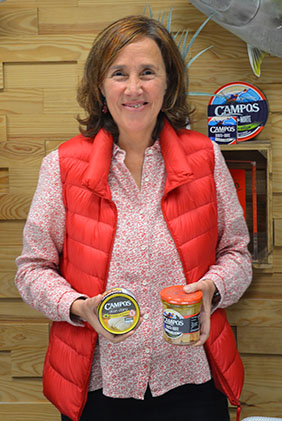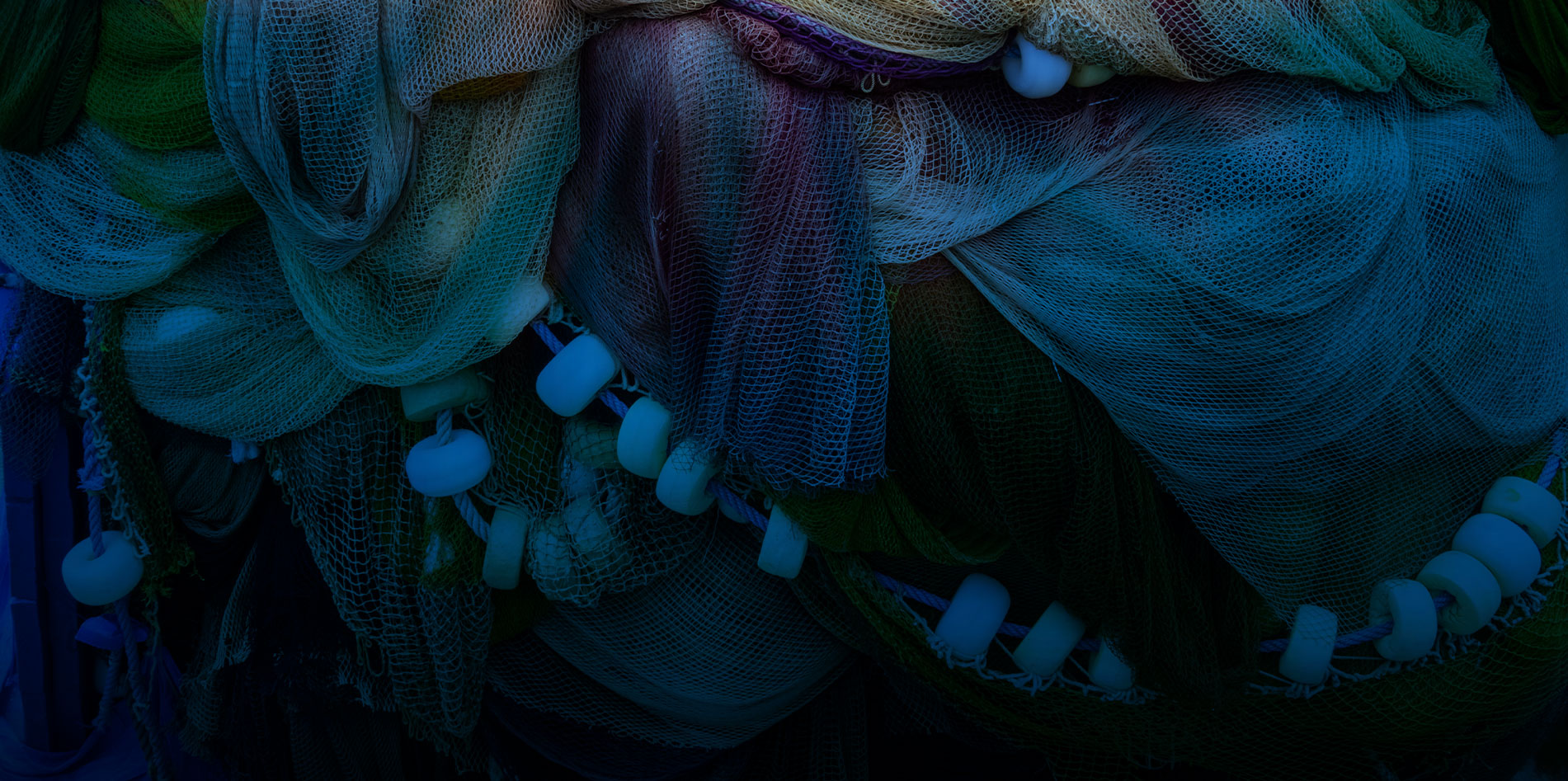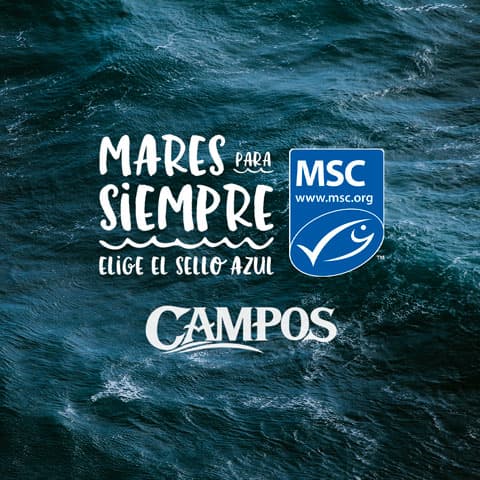
CONSERVAS CAMPOS
«Extraction and processing activities should be integrated in response to new sustainability standards»

Marta Pagazaurtundua
Sustainable Development Director of Conservas Campos
Conservas Campos
Marta Pagazaurtundua, Sustainable Development Director of Conservas Campos, highlighted the commitment to certifications (such as MSC) for their products, as part of a strategy covering economic development, respect for the environment and social wellbeing.
What does sustainability mean for Conservas Campos?
For Campos sustainability is a fundamental principle of our business and at the same time a goal we pursue daily; i.e. it’s the guarantee of our future. We assume the UN Brundtland Commission as ours, i.e. “to meet the needs of the present without compromising the ability of future generations to meet their own needs.” In other words, we stay away from sustainability by area and scope of action to embrace integral 360º sustainability, where we commit to a balance between economic development, respect for the environment and social wellbeing.
The commitment to certifying some of your products with the MSC label is long-standing. What does that blue label imply?
Correct! Campos was the first canning company to obtain the MSC custody chain certificate in their Spanish and Ecuadorian plants in 2007 and 2009 respectively. Since then we’ve been increasing commercialisation of blue label certified references. A label which guarantees the fishing of our products is done in sustainably managed fisheries, where their impacts on wild fish populations, ecosystems and their future have been assessed. Our commitment to MSC certified products has been guaranteed with the recent certification of our fleet, Albacora, as the first tuna company in the world to certify its catches in all the ocean regions pursuant to the MSC Sustainable Fishing Standard.
Are consumers aware of the importance of purchasing products resulting from responsible fishing?
Although it’s true more and more customers include sustainability criteria in their purchases, we believe there’s still a long way to go for them to correctly interpret the meaning behind each stamp/logo/eco-label which generally identifies products of this kind. In the case of MSC blue label, thanks to MSC’s enormous work in disseminating this via different campaigns, both consumer and distribution oriented, we’re beginning to see greater knowledge regarding what said label involves.
Campos’ involvement in sustainable fishing goes beyond that label as you collaborate with some MSC initiatives like the ‘Seas Forever Week’.
Exactly! Our participation in initiatives centred on sustainability goes beyond the use of eco-labels. So, from the fishing resource sustainability perspective, we’ve been taking part in the MSC ‘Seas Forever Week’ ever since it began, and likewise take part in the AENOR-APR Responsible Tuna Fishing promotion campaigns which have been taking place in recent years, whose main aim, among others, is to ensure the social and work safety conditions on board the fishing vessels.
«Campos was the first canning company to obtain the MSC custody chain certificate in their Spanish and Ecuadorian plants in 2007 and 2009 respectively»
With the MSC and APR certifications of both our fleet and processing plants we ensure the sustainability of our products. Safe traceable legal healthy fish caught by fleets which safeguard their workers’ rights as well as preservation of the fishing resource and their habitat, fish which are subsequently processed by companies guaranteeing their staff’s working conditions together with a focus on environment protection.
How do you manage to extend this commitment to your suppliers?
At Campos we select our raw and auxiliary material suppliers based on economic, environmental and social criteria. We believe that only doing it this way we’ll be able to maintain our activity in the future, while at the same time generating shared value throughout our entire supply chain. The tuna supply chain is complex since numerous players located in different countries intervene, implying different contexts from both a regulatory perspective as well as a cultural and socioeconomic one. Prior to initiating any contractual relationship with our suppliers, it’s essential for Campos to know the context where their activity is carried out, and based on that, (and always pursuant to the regulatory framework applicable to their activity) we inform them of our code of conduct and request their adhesion to the same. We work with each of our suppliers to establish a series of minimum environmental and social baseline requisites, and from them we lay down the bases for a solid relationship in order to improve together.
With the experience of a company with over a century of history, how do you view the future of the fishing activity and the canning industry?
We visualise a future where the integration of extraction and processing activities is essential to respond to current challenges, i.e. an ever more demanding and limiting regulatory framework, adaptation to new standards and sustainability certifications demanded by customers/great distribution channels, plus better use of resources among others. On the other hand, we feel that without the global commitment by all the groups of interest, where the rules of the game are the same for all the players without exception, regardless of the country where they operate or the type of company they are; their future will be seriously compromised.
From fishing resource preservation to respect for gainful employment
Sustainability plays a role in numerous areas. What other actions does Campos undertake to minimise the impact of their activity?
From the fishing resource sustainability perspective, we’re part of ISSF (International Seafood Sustainability Foundation), voluntarily committing ourselves to compliance with preservation measures generated as the result of different scientific studies carried out thanks to the participation of the Albacora vessels among others. From the social perspective, the tuna processing industry requires an intensive labour process with great added value. Our policies and efforts are aimed at generating gainful sustainable employment, respecting workers’ rights and fostering a safe environment for our personnel. We likewise involve ourselves in the communities where we operate, via different projects, for example: creation of jobs for recycling nets in coastal communities, promotion of sporting events certified as sustainable whose purpose is fostering sport as a healthy activity, and even the dissemination of the natural and cultural heritage of the environment where we are operative, via our commitment as a company adhered to the European Charter for Sustainable Tourism in Protected Areas-EUROPARC España.




